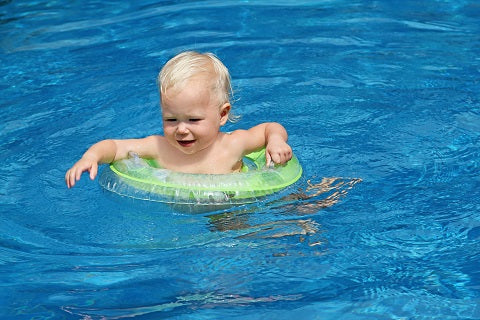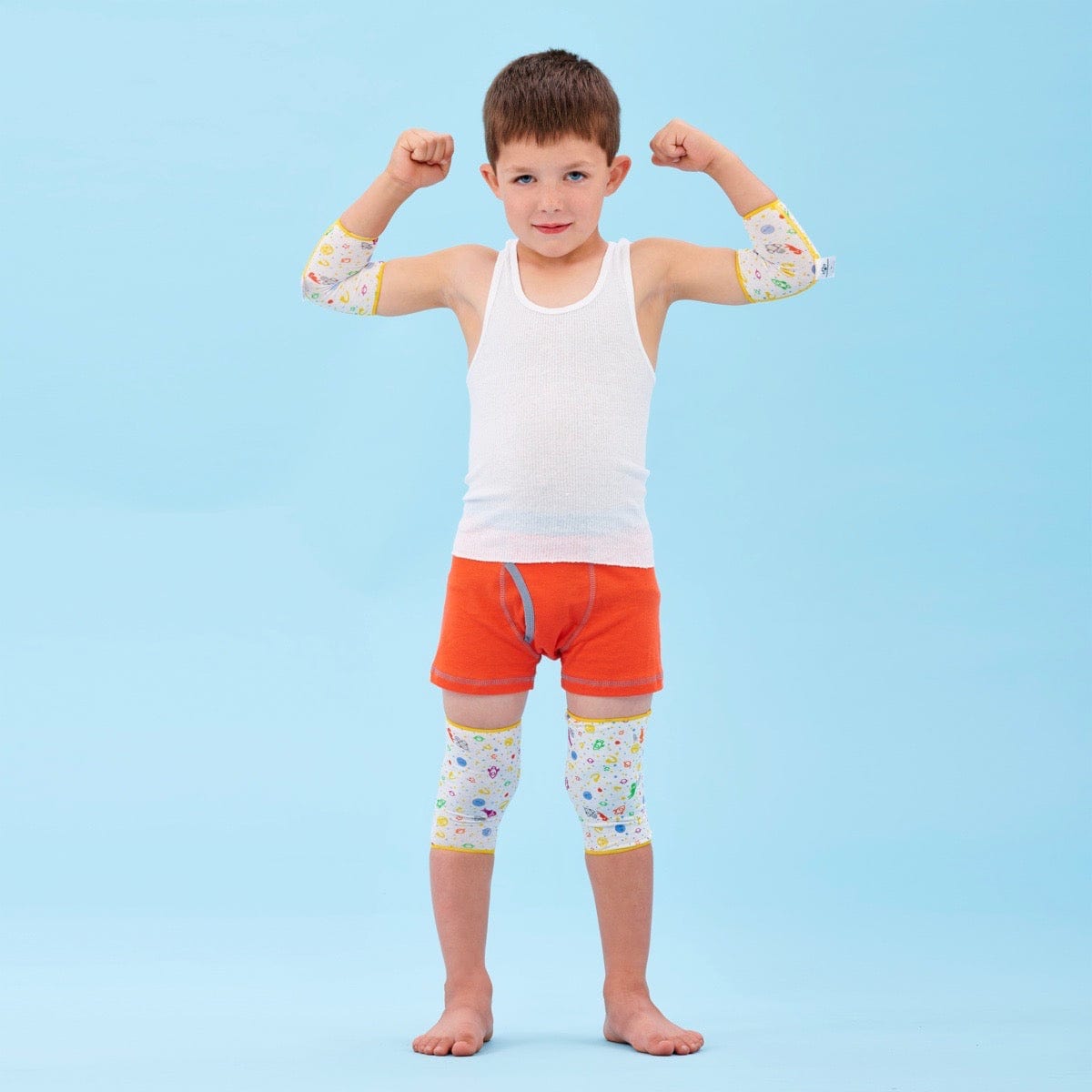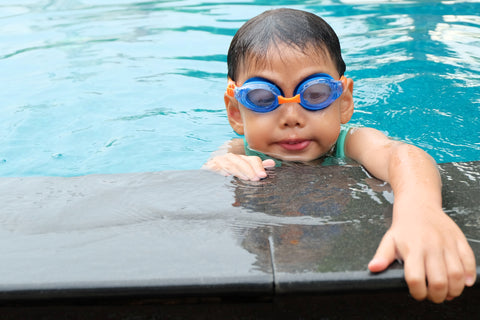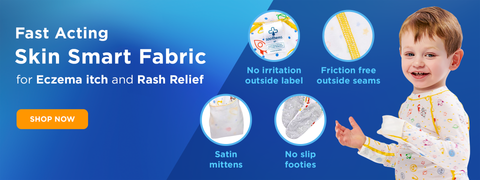Eczema and Swimming: How to Manage at the Beach and Swimming Pool
Your child has moderate to severe eczema and struggles with flare-up triggers all summer long. You know what your child’s eczema looks like and how uncomfortable they get. But you are afraid that taking a kid with moderate to severe eczema and their red, irritated, rash and dry, flakey skin to the beach or pool will make their atopic dermatitis flare up worse.
What to know before taking your eczema child to the pool or beach
Before taking the plunge this summer with your child’s eczema we will address these topics and offer tips for the entire family to enjoy a summer of fun at the pool or beach:
- Does swimming increase or decrease eczema symptoms?
- Is chlorinated pool water better than saltwater for a child suffering from an eczema flare- up?
- What should I do for a child with eczema to go swimming? Are there ways to protect my baby’s eczema skin when swimming?
1. How safe is it to take your baby with eczema swimming?
Generally, water is good for eczema skin under certain Swimming is great for all children including for an eczema baby and the earlier the better to learn to swim. Swimming offers long and short-term health benefits including better sleep (we all know the challenges of getting an eczema baby to sleep, stronger lungs (research by the American College of Allergy, Asthma & Immunology shows that up to 80% of children with eczema develop asthma later in life.) and reduced bacterial infections in eczema-damaged skin. Child development experts, public safety officials and physical therapists all rate learning to swim as one of the most important developmental achievements in a young child’s life. Swimming activities can help control symptoms by strengthening the heart and lungs. Swimming can also help increase a child’s confidence, patience, balance, and coordination. Swimming is a life skill that will help keep them safe in or around water, plus swimming is fun for kids!
2. Despite these positives benefits of swimming, there are a lot of legitimate concerns and realities about taking a child with eczema swimming:
- Pool: Is Chlorinated Water Good for Eczema?
Swimming in a chlorinated pool can help irritated skin because the chlorine will kill the bacteria that develops an infection. Too much chlorine in a pool can make the skin dry, red, and aggravated though. The National Eczema Society of the UK advises parents to avoid taking children with eczema swimming if their eczema skin rash is flaring badly and already red, flaky, oozing and infected. And if in doubt about whether to allow a child with eczema to swim in a pool, try to find out how much and when was chlorine last added at the pool.
- Beach: Is Salt-Water Good for Eczema?
Saltwater can be soothing and beneficial to eczema rashes because of the natural antiseptic properties that can help reduce the risk of infection and help open and weeping eczema sores heal. Saltwater also has many natural minerals that can act as an anti-inflammatory to relieve itching and help skin moisturize. But for some infants and children with exceptionally sensitive eczema skin saltwater can also sting if there are weeping and broken skin lesions on the eczema skin.
Healthcare Advice: Whether you are at the pool or the beach it is advised that you only spend a short amount of time in the water in case the eczema condition worsens. Water that is too warm could dry out the skin and cool water temps will feel soothing to an eczema baby. Babies with mild to moderate eczema conditions are usually fine in the pool or at the beach. For children suffering from severe eczema flare-ups, it is always best to consult your dermatologist before going to either the pool or beach.
3. Are there ways to protect my baby’s eczema skin when swimming? What precautions should I take for my eczema child swimming?

Tips for protecting your eczema baby:
- Avoid public pools: Typically, public pools (country clubs, municipalities, resorts, etc.) add heavier doses of concentrated chlorine to shock the water and kill bacteria. Check with pool management for when they chlorinate the water and try to not enter the water for at least 3 hours after the chlorine is added.
- Avoid tidal algae: Be watchful of seawater warnings for bacteria like red tide and other harmful algal blooms and sea-born nutrient pollutions that will irritate the skin.
- Moisturize before and after swimming: A great tip for protecting your eczema baby at the beach or pool is to put a moisturizer like Vanicream moisturizing cream for eczema and psoriasis on their skin before getting into the water. Sun, saltwater and pool chemicals like chlorine can dry out the skin but adding a layer of moisturizer will protect skin moisture levels. Consider adding a rash guard or swim shirt from UV Skinz to protect the moisturizing cream from smearing off and getting all over everything. Reapply moisturizing cream after toweling off!
- Prepare for your swimming adventure: On days when the eczema itch-scratch cycle is peaking moisturize the skin a few hours before going to the beach or pool and then again right before swimming. Keep a tube of a small tube of Vanicream in your beach bag.
- Severe Eczema Flare-ups: If your child’s eczema rash has rough bumps that leak fluid and are crusting over you may want to treat these areas with Vaniply Ointment Skin Protectant for eczema and psoriasis as a barrier to keep water and irritants out.
- Cover the skin with ultra-violet protective clothing that has a UPF rating of 50+: UV Skinz offers a full range of sun protective clothing and are experts in UV protective swimwear for infants and kids. Whereas many dermatologists recommend a limited amount of sun as a form of ultra-violet radiation to help the red, irritated rash of mild to moderate eczema with Vitamin D. Research has shown that lower levels of Vitamin D lead to more severe eczema flare-ups. But sun exposure is both UVA and UVB and is not phototherapy. Young skin is tender and studies have shown that damage to sensitive infant skin lasts a lifetime. Be careful when in the sun with a child that has inflamed, irritated skin with red bumps, weeping blisters, and dry flakes as they can get permanent skin damage and scars from overexposure to the sun. Atopic dermatitis phototherapy is a narrow band of UVB light which is the best part of ultra-violet radiation for people with moderate to severe eczema - Phototherapy helps to: Reduce itch.
- Use Physical Blocking, Mineral Sunscreens: Always use a high-quality sunscreen that is water resistant when going to the beach or pool. Look for moisturizing sunscreens that have a high content of the active ingredients of Zinc Oxide (ZnO) and Titanium Dioxide (TiO2). CōTZ® Sensitive SPF 40 Mineral Sunscreen and extra gentle CōTZ® BABY SPF 40 Mineral Sunscreen protects and soothes sensitive or easily irritated skin. Gentle, non-tinted cream blends translucent, leaving a soft, sheer finish. 20% of Zinc Oxide is Dermatologist Recommended for even the most sensitive skin.
After a day at the beach or pool, your child will most likely be tired and ready for good night sleep. Give them a good bath or shower to thoroughly wash off and reapply your favorite moisturizer. Cover the moisturizer with Soothems eczema sleepwear with Zinc Oxide and read them Search for a Smile in the Moon for a good night’s sleep. The culmination of taking these simple tips for protecting your child’s eczema at the beach or pool and getting a good night sleep with help reduce stress and speed the recovery of your baby’s eczema.






Leave a comment
All comments are moderated before being published.
This site is protected by hCaptcha and the hCaptcha Privacy Policy and Terms of Service apply.